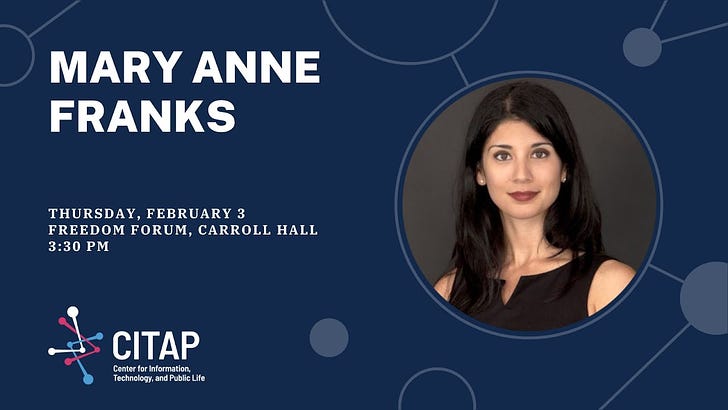Yesterday, the CITAP spring speaker series kicked off with a talk from Mary Anne Franks on how technology companies have commodified our understanding of free speech.
Dr. Franks cited a 2019 study from the First Amendment Center at the Freedom Forum institute, in which 65% of survey respondents agreed that in banning users, tech companies violate their First Amendment rights. Data like these suggest that our common understanding of free speech has shifted from being a negative right protecting citizens from government interference to a positive right to an online forum and amplification of our speech.
Through a tour of John Perry Barlow’s Declaration of the Independence of Cyberspace to the introduction of Section 230 of the Communications Decency Act to Reddit’s 2012 defense of communities using the platform to share ‘creepshots’ and ‘jailbait’ photos, Franks explored the rhetoric of free speech as applied to online spaces—and the financial realities that underpin that rhetoric.
Didn’t get to join us on campus or via the livestream? There’s a video, and it’s worth a watch:
Recent publications and appearances
“What social media does is give politicians access to audiences in a much more immediate way and a much greater way, in terms of scale,” Daniel Kreiss discussed the trend of “personalization in politics” with the Boston Globe for a story on Mayor Michelle Wu’s use of Twitter.
Wishing a happy publication week to The Black Agenda, a collection of essays imagining America’s future policy, climate, work, criminal justice, and much more, with a foreward by Tressie McMillan Cottom!
“Even without sizable social media platforms, mediatization has now caused us to act like we're the micro–celebrities of our own lives.” The Daily Pennsylvanian digs into the downsides of “rebranding” oneself, citing research from Alice Marwick and upcoming CITAP speaker series presenter Jessa Lingel.
Coming soon
February 16: Johns Hopkins president Ron Daniels will discuss his book What Universities Owe Democracy at UNC’s Wilson Library. Register to attend in person or online.
February 18: The call for papers is up for CITAP’s cosponsored ICA preconference What Comes After Disinformation Studies? The preconference will take place May 25, 2022 in Paris, France. Submissions due February 18.
March 10: The CITAP spring speaker series continues with Jessa Lingel, associate professor at the Penn Annenberg School of Communication and author of An Internet for the People: The Politics and Promise of craigslist. Join us in-person or via the livestream!
Rest of Web
“I encourage social scientists, tech critics, and advocates to look at the tech company as a racialized organization. Naming the whiteness of organizational practices can help deconstruct how tech companies are terrible places to work for people of color, but also enable an analysis of how certain pernicious incentives enable them to justify and reconstitute their actions in surveillance capitalist and carceral infrastructures.” Alex Hanna on the whiteness of the tech industry and leaving Google.




